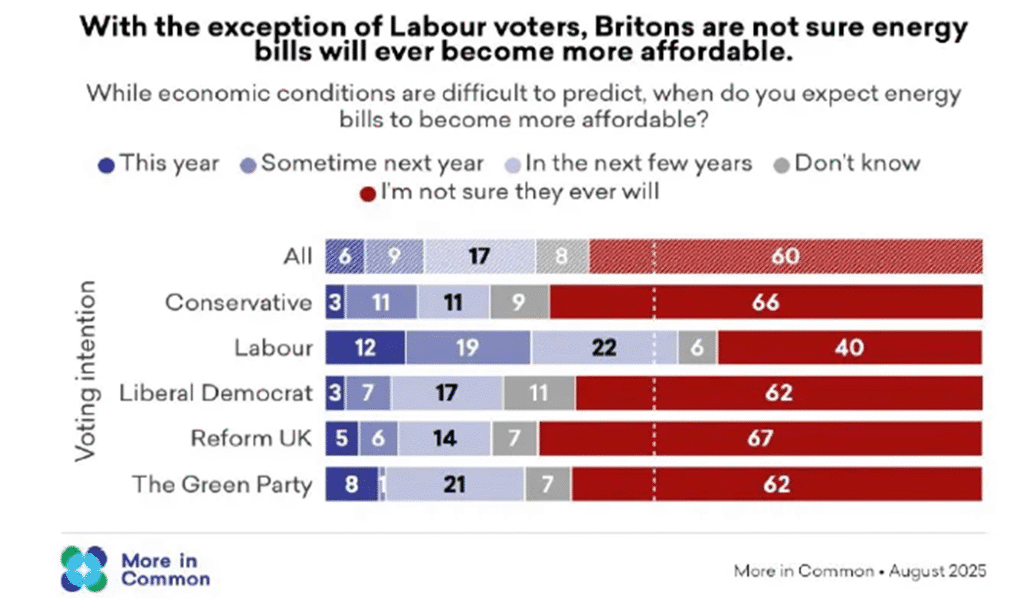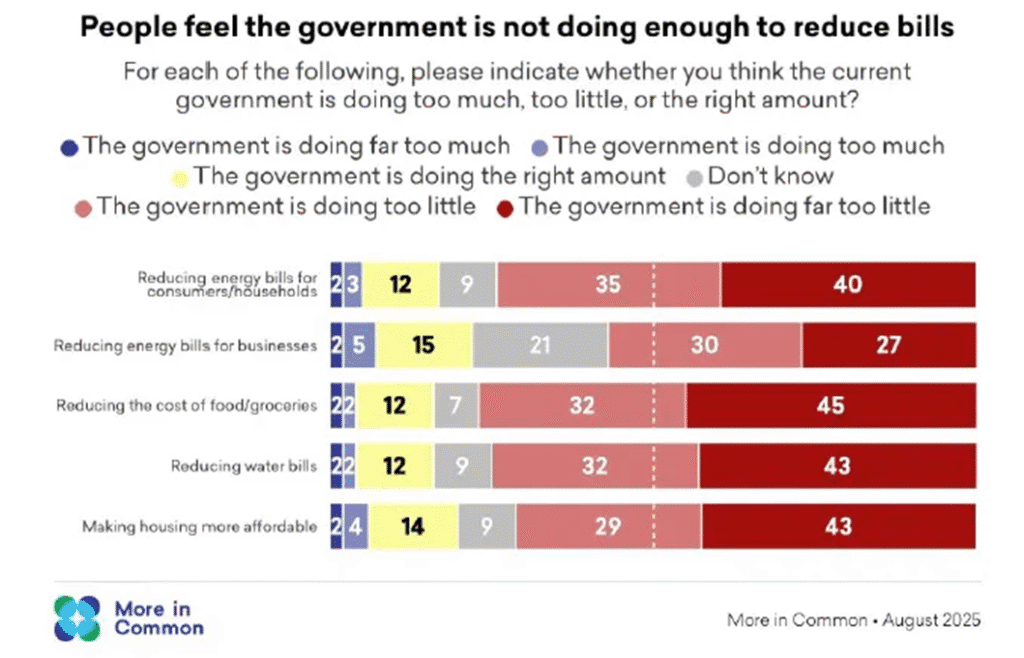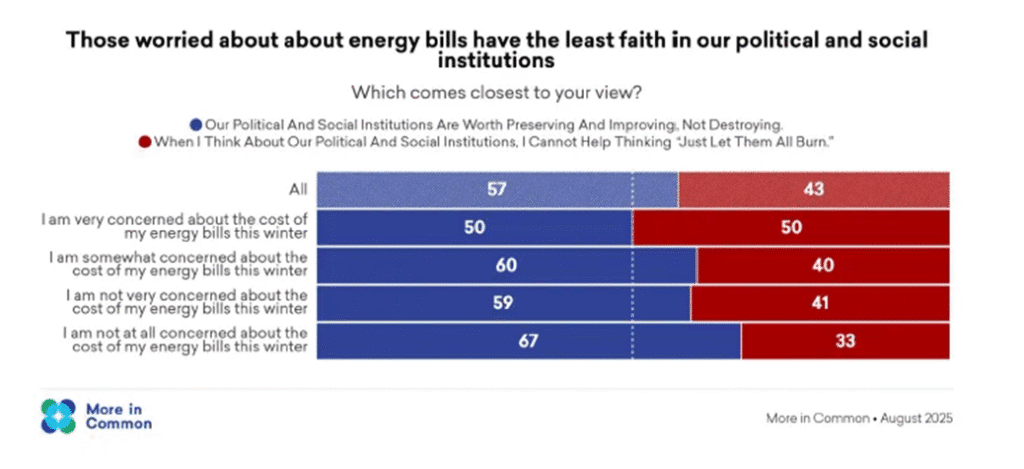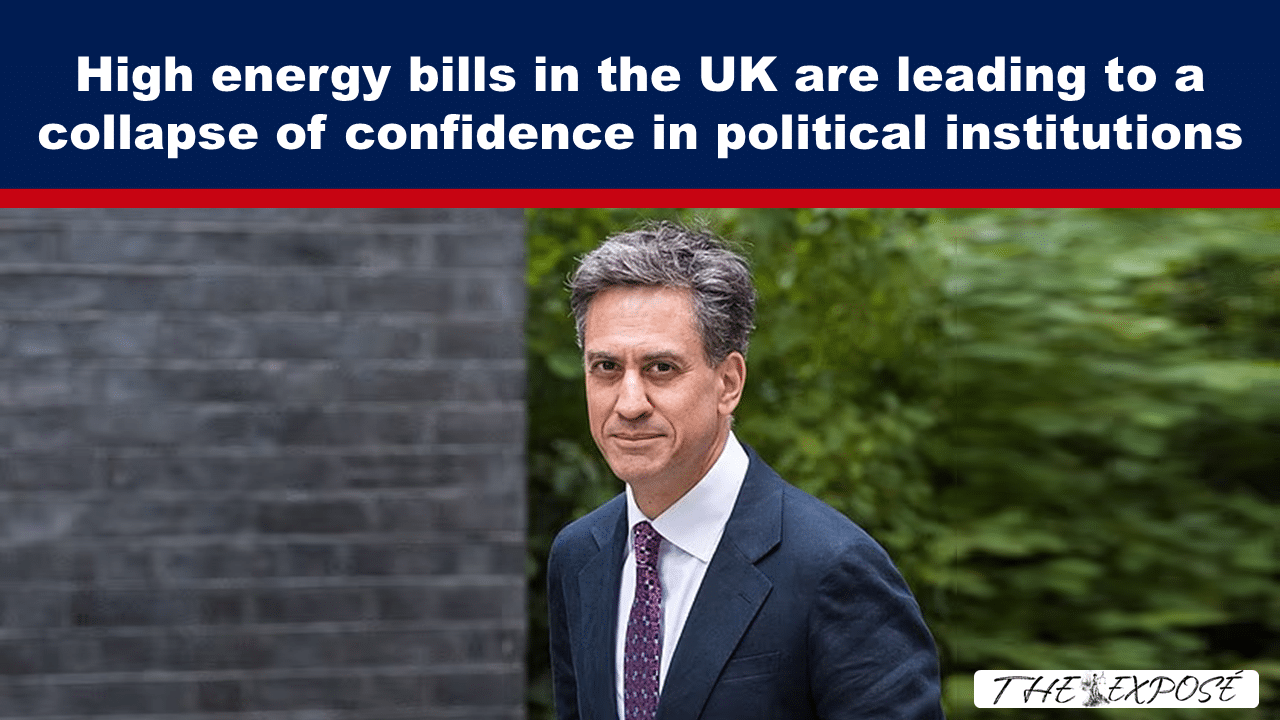According to recent research, high energy bills are the top concern for British families, causing stress, anxiety, and harming mental health and quality of life.
Nearly half of Britons believe the Government has no plan to address the problem or has a plan that is making things worse.
“The level of concern about energy bills, coupled with the perceived lack of action, is leading to a collapse in confidence in political institutions,” David Turver writes.
Things have got so bad that the high energy bills are fuelling a revolutionary mood: 43% of people think that political and social institutions should just be left to burn.
Let’s not lose touch…Your Government and Big Tech are actively trying to censor the information reported by The Exposé to serve their own needs. Subscribe to our emails now to make sure you receive the latest uncensored news in your inbox…
High Energy Bills Fuelling Revolutionary Mood
By David Turver, 26 October 2025
Introduction
New research out from More in Common shows that the cost of living is the top concern of British families and high energy bills are the dominant driver of this concern. High energy bills are having a profound impact, seriously harming mental health and quality of life. Nearly half of people believe the Government has no plan, or a plan that is making things actively worse.
Let’s dig into the details of the findings and consider what immediate actions the Government could take to alleviate the pain.
Headline Findings
The report finds that three years of high energy bills have scarred the national mood, making nearly all income groups feel stressed and anxious. High energy bills mean many people feel that no matter how hard they work, they will never be able to get ahead and enjoy a comfortable life.
In a stunning indictment of Ed Miliband’s Net Zero policies and his Clean Power 2030 plan, 60% of people do not believe that energy bills will ever be affordable again. More in Common says that the sense that the Government is standing idly by as people are exploited is feeding anti-system attitudes that are driving voters away from the established parties.
The level of concern is high among people earning just enough to be ineligible for government support. These people will react negatively to policy approaches that focus the burden of high energy bills away from the most vulnerable onto the “just about managing.”
Widespread Concern and Stress
As shown in Figure 1, 73% of households are somewhat or very concerned about energy bills this winter.

The level of concern is most acute in low-income groups, but 57% of households with over income over £100,000 are also concerned about high energy bills. This is leading to increased stress and anxiety, with many having trouble sleeping and putting up with living in a home that is uncomfortably cold.
Many people are also making the connection between high energy bills and the broader economic malaise. High energy bills impact businesses directly, forcing them to push up prices. They also reduce consumer demand because customers have less disposable income to spend.
As shown in Figure 2, concern about energy bills also cuts across party lines.

Reform voters are most worried about energy bills, with 80% somewhat or very concerned. In a superbly ironic twist, nearly three-quarters of Labour and Green voters are concerned about high energy bills this winter. The voters for the parties that have been pushing the “cheap renewables” line most actively are concerned about the impact of their policies.
Britons Resigned to High Energy Prices
As shown in Figure 3, except for Labour voters, people are not sure that energy bills will ever become affordable.

Around two-thirds of Conservative, Liberal Democrat and Reform voters are not sure energy bills will ever become more affordable. Emphasising the earlier point, 62% of green voters also appear to have lost faith in the “cheap renewables” mantra. Even 40% of Labour voters no longer believe Ed Miliband’s promise to reduce bills by £300.
Who is to Blame for High Energy Prices
In a worrying sign for Labour, 75% of people believe the actions of the UK government are somewhat or entirely to blame for high energy bills, as shown in Figure 4.

Energy suppliers and generators also come in for their share of the blame. Many people no longer believe that high energy bills can continue to be blamed on the war in Ukraine.
Many people believe that the Government could take action to reduce energy bills but is actively choosing not to do so. Some Britons were also concerned that the Government is actively making things worse by prioritising the need to decarbonise our energy system.
No Plan to Bring Down Bills Eroding Trust
Figure 5 shows that most people believe the Government is doing too little to bring down energy bills for consumers and businesses. They also have little faith that the Government will bring down the cost of food, water or housing.

In a worrying development, many people believe that the Government could just step in and cap prices, rather than tackle the root causes of high energy bills.
The level of concern about energy bills, coupled with the perceived lack of action, is leading to a collapse in confidence in political institutions.

While 57% believe our political and social institutions are worth preserving and improving, a worrying 43% cannot help thinking “just let them all burn.”
Focus on Cost Reduction
In focus groups run by More in Common, a clear consensus emerged that the Government should focus on bringing down costs for all rather than subsidising the fuel bills of the vulnerable.
This is interesting because most of the evidence given to the recent Parliamentary inquiry into the cost of energy was displacement activity focused on peripheral issues and on the kind of pocket-shifting solutions rejected by the participants in this research.
The research did not cover specific policies that people would favour to bring down costs. However, the Government needs to take drastic action if it is to head off the growing revolutionary mood. We have long covered ideas to cut energy bills and reiterate them here:
If the Government wants to follow the clear wish of the people consulted in the More in Common research, it really needs to tackle the root causes of high energy bills by implementing the following measures.
1. Remove Carbon Costs
As shown in Figure 7, Ember has produced an interesting chart breaking down the fuel costs and carbon costs of gas-fired electricity.

In August, fuel costs were £54.67/MWh and carbon taxes were £25.77/MWh, or 32% of the total wholesale cost. Eliminating carbon costs from the Emissions Trading Scheme (“ETS”) and the Carbon Price Support mechanism would immediately reduce energy bills for both consumers and businesses. It would also have the welcome knock-on effect of reducing the total revenue received by generators funded by Renewables Obligation Certificates (“ROCs”) and might also reduce grid balancing costs.
2. Cut VAT
VAT of 5% is currently added to energy bills. Cutting VAT to zero would immediately reduce energy bills for everyone.
3. Cut Renewables Subsidies
There should be no new subsidies for renewables. This will render most of them uneconomic, and mean we no longer need to fund the planned expansion of the grid.
We should also consider cutting existing subsidies by setting the Renewables Obligation to zero, immediately removing ~£7.5 billion of costs from energy bills. It is probably also time to consider reducing the £2 billion cost of Feed-in-Tariffs (“FiT”) by stopping the annual indexation in line with inflation. FiT payments could be stopped for those who have already received payments in excess of the initial capital cost.
4. Knock on Effects
The reductions in energy bills from the measures outlined above will have important knock-on effects. The Warm Home Discount can be reduced or eliminated for all but the most vulnerable because there will be less need for it. Moreover, the Energy Company Obligation that forces companies to install insulation measures could also be cut because it is of dubious value and there will be less need if energy is cheaper. These measures will cut energy bills for everyone.
Moreover, fewer renewables on the grid means we will not need as much backup from the capacity market and grid balancing costs will stop rising and may even fall.
5. Fix Energy Supply
The Government must also look forward and fix the energy supply. They should lift the ban on North Sea drilling and end the moratorium on fracking so that we can develop more of our own gas resources. Simple supply and demand economics will ensure that an increased gas supply will reduce prices. This will improve our balance of payments, create good, unsubsidised jobs, improve energy security and have a smaller impact on the environment than importing LNG from the US or Qatar.
Conclusions
High energy prices are having a pernicious effect on people, businesses and the wider economy. Voters do not believe the government has a plan to bring down prices, and many believe that plans are actively making things worse. This is breeding a revolutionary mood, with 43% believing that our political institutions should be left to burn.
The Tony Blair Institute now seems aware of the problem and is recommending cutting carbon taxes and slowing down the Clean Power 2030 plan. Even Keir Starmer is rumoured to be considering ditching Miliband’s plans.
They are recognising that we are approaching an extremely dangerous time. They should be implementing the easy measures that would cut energy bills overnight. The Government should eliminate carbon taxes, cut VAT and slash renewables subsidies to bring down energy bills, calm the electorate and set us back on the path to growth and prosperity.
About the Author
David Turver is a British retired consultant, chief information officer and project management professional. He publishes articles on a Substack page titled ‘Eigen Values’ where he writes about contentious issues such as climate, energy and net zero. You can subscribe to and follow his Substack page HERE.
Featured image: UK Energy Secretary Ed Miliband has increased the maximum price wind farms could receive for their energy, July 2025. Source: Daily Mail

The Expose Urgently Needs Your Help…
Can you please help to keep the lights on with The Expose’s honest, reliable, powerful and truthful journalism?
Your Government & Big Tech organisations
try to silence & shut down The Expose.
So we need your help to ensure
we can continue to bring you the
facts the mainstream refuses to.
The government does not fund us
to publish lies and propaganda on their
behalf like the Mainstream Media.
Instead, we rely solely on your support. So
please support us in our efforts to bring
you honest, reliable, investigative journalism
today. It’s secure, quick and easy.
Please choose your preferred method below to show your support.
Categories: Breaking News, UK News
